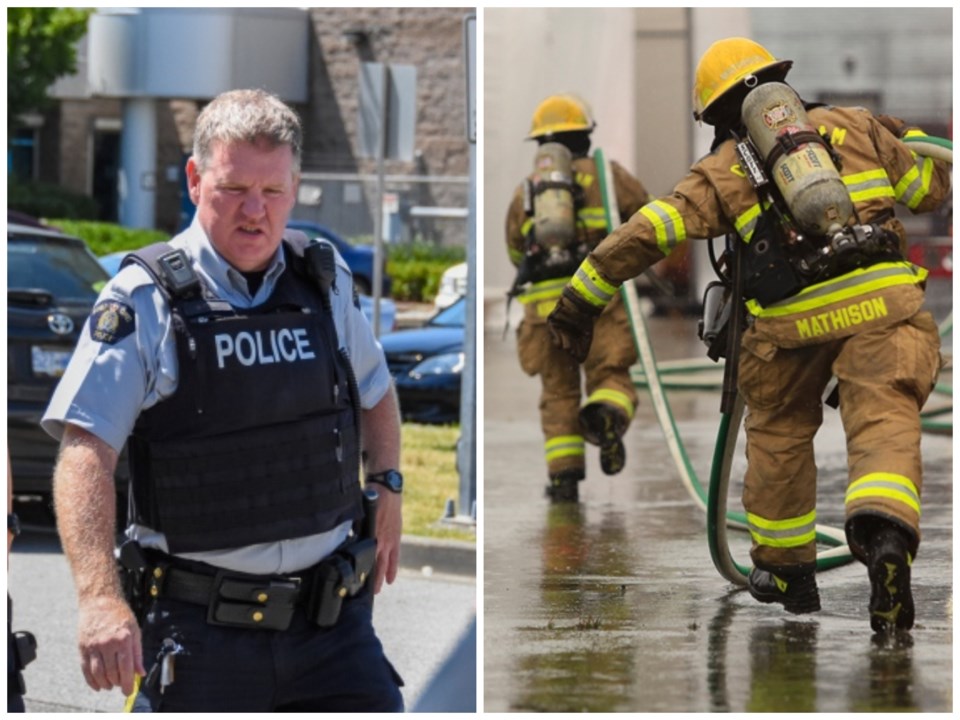Emergency services across the Tri-Cities are ramping up safety protocols against infectious disease as people across the region, and country, hunker down to prevent the spread of COVID-19.
Coquitlam RCMP announced Tuesday it would be closing its community police stations until further notice and limiting front counter services, including fingerprinting for criminal background checks. The detachment on Guildford Way will remain open.
“If you arrive at the detachment when the front counter is closed, we have an after-hours intercom located to the left of the front door. If you are exhibiting symptoms, including fever, coughing and difficulty breathing, do not come to the detachment for police services,” Coquitlam RCMP spokesperson Cpl. Michael McLaughlin said in a press release Tuesday.
“At this point, we are getting multiple directives from the RCMP, government and various health authorities every day. We're staying flexible and adapting to those directives as they come,” Cpl. McLaughlin added in an email.
Emergency calls, including 911 will continue to be handled uninterrupted.
But the detachment has introduced increased screening on incoming calls and ongoing files to get more information about a person’s health and travel history. Police officers have also beefed up their personal protective equipment and have begun to carry masks, gloves and sanitizing equipment.
The Tri-City News requested an interview with Supt. Annette Fellner, the officer in charge of Coquitlam’s detachment, but she declined.
In a emailed statement, she wrote: “We feel we are well-stocked at the moment but will continue to monitor the situation and adjust as necessary,” adding, “Both National RCMP and E Division RCMP are working to ensure that our members have the most up-to-date information for their protection and the protection of the public that we serve.”
What those measures are is not clear at this time.
Coquitlam Fire and Rescue deputy chiefs Rod Gill and Shawn Davidson told The Tri-City News the department has taken a backseat on non-life-threatening medical calls in an effort to stem possible transmission of the virus.
“If there’s no reason to intervene, we let [BC] Ambulance do its thing,” Gill said, adding, “If we’ve got someone who’s had a stroke, cardiac arrest, we’re jumping right into the scene.”
Now, when firefighters are called to someone’s residence for a general illness situation that’s not life-or-death, they’ll often stand back in the doorway and call in a few questions before entering.
“We’ll ask, 'Do you have any trouble breathing? Do you have any medications? Do you have chest pains?'” said Gill. “If we need to send someone in [we’ll do it] with a gown, mask, glasses and gloves. Minimize contact. One firefighter will go in initially.”
The changes are part of a wider response directed through a newly opened Emergency Operations Centre run by the city of Coquitlam. Gill and Davidson run point for the fire department in the same way they would during any natural disaster.
But the outbreak of a disease also calls for an unprecedented set of measures to stem the spread of the disease and, to that end, Coquitlam Fire and Rescue has cancelled all its fire hall tours and shut down the community room at its facility on Burke Mountain.
Monday, March 16, the department circulated a directive to clean light switches, keyboards, trucks, gear — any hard surfaces — twice a day.
“We’re getting hourly emails, taking all the precautions they’re telling us,” said Gill. “We’ve definitely ramped it up.”
Firefighters regularly wearing N95 masks — the mask gets its name from the 95% of particles it filters out that are greater than 0.3 microns — and Gill said the department has a “couple thousand in stock,” a normal supply that should last for months.
Suppliers for the masks as well as other personal protective equipment have been secured by the Fire Chiefs Association of British Columbia and they’ve put together a “one-stop shopping” central location for all fire departments across the Lower Mainland, said Gill.
But as emergency services initiate crisis protocols to stem the spread of the COVID-19 pathogen, some are already short-handed. Coquitlam Fire currently has 12 firefighters in self-isolation, though Gill says they are off-duty as a precautionary measure.
Just how many firefighters the department can lose before it begins affecting operations is something the team of emergency response planners are assessing on Tuesday.
“This situation is ever evolving,” said Gill, adding one thing was clear: “People need avoid large crowds. Stay home.”
—
For all our special coverage of the novel coronavirus outbreak, go to www.tricitynews/covid-19.



